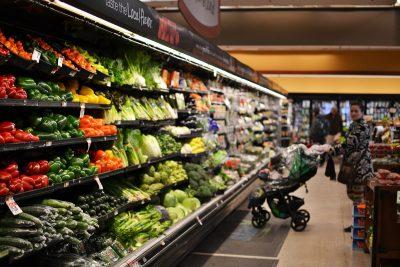
By Julia Ermi
Food insecurity is taking a bite out of Greater Boston during a pandemic that continues to sweep the country.
Despite $8.3 million in relief from the Massachusetts COVID-19 Relief Fund, and a $56 million investment by the Baker-Polito administration, an increasing number of residents are growing hungry.
Food insecurity in Eastern Massachusetts, linked to financial turmoil caused by the coronavirus pandemic, is projected to increase 59 percent in 2020, according to a study by Feeding America.
One in eight people in Eastern Massachusetts is expected to face food insecurity this year, as opposed to one in 13 before the pandemic began.
Gary Roy, senior manager of public relations for Greater Boston Food Bank, wrote in an email that these projections align with what his organization has been experiencing.
The last four months have seen the most activity in GBFB’s 40-year history, Roy wrote.
Before the pandemic, the most food GBFB had ever produced was an average of 5.7 million pounds per month in 2019, Roy wrote. The food bank’s production then hit 8.1 million pounds in March, and increased to 11.5 million pounds by June.
To combat this growing food insecurity, the Baker-Polito administration announced a $56 million investment in May, with $36 million going to the COVID-19 Food Security Infrastructure Grant Program, which awards grants to local households and food sourcers.
The COVID-19 Relief fund has awarded $8.3 million in grants to local organizations, according to the website.
Yazmin Rodriguez, operations manager at Action for Boston Community Development, a nonprofit providing low-income Bostonians with resources to help transition out of poverty, said that this funding has not been enough.
ABCD had also received grants from the Harvard COVID-19 Emergency Relief Fund and the Charlesview COVID-19 Emergency Response Fund, but continues to struggle in providing enough resources.
“The prices have increased,” Rodriguez said. “So we’re purchasing more, but we’re also spending more because the prices of stuff have gone up.”
Besides putting pressure on the organization’s lack of monetary resources, Rodriguez said the pandemic is also making it difficult for ABCD to reach those in need.
Since ABCD’s neighborhood support centers shut down in March, the nonprofit has switched to a mostly virtual model, which presents challenges for at-risk groups without computers or smartphones.
“We used to assist with food stamps, so clients would come in and we’d help them fill out the application and submit the documents,” Rodriguez said. “Those were clients who didn’t have access to a fax machine or a computer, so we were providing that service for them.”
Ryan Lee, operations director at Food For Free, a nonprofit that “rescues” uneaten food for redistribution, said Food For Free has had to shift from its in-person model — with programs like Weekend Backpack, during which students would be provided food for the weekend on Friday afternoons — to a delivery and pick-up system.
These new programs have mobilized several thousand volunteers to pack and deliver bags of groceries to people’s homes.
“At the peak,” Lee said, “we were serving about 1,500 families a week.”
Shutdowns of small businesses and universities have also made it more difficult to collect unused food, Lee said, because school and corporate dining halls have closed.
“We can’t safely process the food in the [COVID-19] situation,” Lee said. “Both the supply and the distribution suffered because of it.”
Despite challenges presented by the growing need the pandemic has presented, Rodriguez said ABCD has seen an increase in donations and volunteers.
“[Thursday] we received a donation from Stop and Shop,” Rodriguez said. “Next week we’re getting a donation from the Kraft [Family] Foundation. So there’s been a lot of people trying to help and donate, which has been really helpful.”
Rodriguez said ABCD has also seen an increase in student volunteers from local schools like Boston College since being shut down in March.
Lauren Palumbo, chief operating officer of Lovin’ Spoonfuls, a non-profit that facilitates the recovery and distribution of healthy food, wrote in an email that there is another silver lining to the pandemic when it comes to food insecurity.
“The pandemic shines the light on the issue of food insecurity,” Palumbo wrote. “These issues were already happening in the US, but they have been amplified and magnified during these uncertain times.”
























































































































